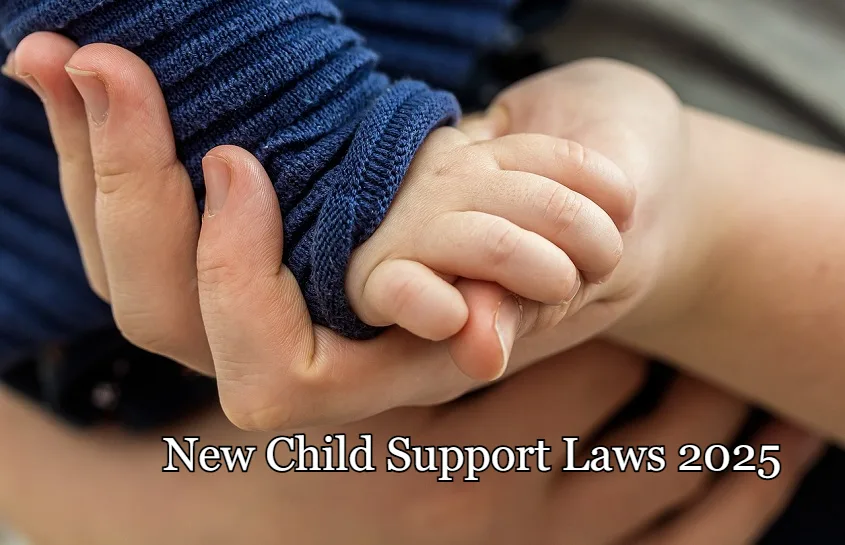Child support rules in the United States are entering a major transition. The New Child Support Laws 2025 are designed to reflect modern family dynamics, shared parenting responsibilities, and rising living costs. Instead of relying on outdated formulas, many states are now focusing on fairness, flexibility, and accurate financial assessments for both parents. These changes affect not only how child support is calculated, but also how custody arrangements, tax benefits, and enforcement measures are handled.
This guide breaks down how the New Child Support Laws 2025 will influence custody decisions, payment structures, and legal obligations, helping families understand what to expect and how to prepare for these important updates.
What’s New in Child Support Law 2025?
For years, child support has been a hot-button topic. Many parents felt the system was outdated, unfair, or simply too rigid. The child support law 2025 is designed to fix that.
Although some people refer to them as the new child support laws 2025 Trump reforms, the updates come from broader national discussions. These changes reflect shifting views on parenting roles, shared custody, and economic realities.
Here’s what’s new:
- More accurate payment calculations
- Preference for joint custody
- Tax benefits distributed more fairly
- Easier ways to request changes to support orders
Major Reforms in the New Child Support Laws 2025
Each state is approaching reform differently, but certain core changes are consistent nationwide.
1. Income-Based and Shared Custody Adjustments
Under the New Child Support Laws 2025, both parents’ incomes are considered when calculating payments. The system now accounts for how much time each parent spends with the child. This means that shared or 50/50 custody arrangements will often result in reduced or more balanced payments.
For instance, states like Florida, Louisiana, and Wisconsin have introduced clearer formulas that calculate payments proportionally to income and custody days. Parents who share custody equally will no longer face heavy payment obligations that ignore shared expenses.
That’s a major win for many dads. The new child support laws 2025 for fathers aim to make parenting time count—not just when it’s convenient, but when it’s consistent.
By State:
- Florida: The New Child Support Laws 2025 in Florida now make equal custody the default. Judges must explain in writing if they order a different schedule.
- Wisconsin: The New Child Support Laws 2025 Wisconsin updates reduce support payments when both parents share equal time.
- Louisiana: In New Child Support Laws 2025 Louisiana, judges have more flexibility but are still guided toward equal-time arrangements.
2. Updated Income Caps and Self-Support Reserves

Another key change is the introduction of income caps and self-support reserves. Low-income parents will have protection against being ordered to pay amounts that leave them unable to meet their basic needs.
Conversely, higher-income earners may see new payment limits to prevent excessive orders.
This change brings more realism and balance to child support — ensuring children receive adequate support without impoverishing the paying parent.
3. Improved Enforcement and Penalty Systems
The New Child Support Laws 2025 also improve enforcement mechanisms. States are investing in digital tracking systems that allow for automatic wage garnishment, tax intercepts, and cross-state cooperation.
However, these laws also emphasize rehabilitation over punishment. Instead of jail time for missed payments, some states now allow job training or financial counseling as alternatives. This shift reflects an effort to keep parents employed and active in their children’s lives.
4. Simplified Modification Processes
Parents can now request modifications more easily when their financial or custody situations change.
Earlier, modification cases often took months or years, leaving many families struggling.
The New Child Support Laws 2025 establish faster review systems, enabling quicker adjustments for job loss, medical emergencies, or changes in custody schedules.
How Payments Are Changing
Child support used to be based on one parent’s income, especially if they had less time with the child. But things are different now.
The child support new law 2025 introduces more thoughtful calculations. Payments now reflect:
- How many nights the child spends with each parent
- Health insurance costs
- Daycare or after-school care expenses
- Both parents’ income—not just one
If both parents split parenting duties and share costs, support amounts are naturally lower. This prevents one parent from being financially overwhelmed while the other contributes less.
Challenges and Criticisms of the New Laws
No major reform comes without criticism. While the New Child Support Laws 2025 aim for fairness, some groups are concerned about their complexity and potential long-term effects.
- Administrative Challenges: Updating systems and retraining staff will take time and money.
- Discrepancies Across States: Each state still has unique formulas, so outcomes may vary widely.
- Potential Burden on Courts: While modification processes are simpler, they may initially flood courts with new requests.
Still, most experts agree the new system is a step toward fairness and modernization.
Fathers See Major Shifts in Responsibility—and Relief

It’s no secret that many fathers felt overlooked in the family court system. The new child support laws 2025 for fathers are a game-changer.
If a father shares equal custody, his support amount may drop significantly—or even disappear altogether. Courts are finally recognizing that parenting isn’t just about time—it’s also about real-life involvement.
Some key changes for fathers include:
- Lower minimum payments for those with lower incomes
- Recognition of time spent with children, not just financial contributions
- Ability to modify existing orders more easily
Taxes: Who Claims the Kids Now?
It used to be unclear who could claim a child on their taxes. That led to conflict, especially when parents shared custody.
The new child support laws 2025 taxes address this directly.
Now:
- Only one parent can claim the child as a dependent
- The parent with majority custody usually gets the tax credit
- In 50/50 cases, the lower-income parent may get the credit—unless parents agree otherwise
These updates help reduce confusion during tax season and prevent double claims that can trigger IRS audits.
Minimum Payment Rules Just Got a Lot Fairer
In past years, some parents—especially low-income fathers—struggled with fixed minimum payments, even when they couldn’t afford them.
Under the child support law 2025, states can now set more flexible minimums.
For Example:
If a father makes under a certain threshold and shares time equally, he may pay as little as $50 a month.
What is the minimum a father has to pay for child support?
In 2025, many states allow minimums as low as $50/month, depending on income and shared custody status.
This change is especially helpful in states like Louisiana and Wisconsin, where costs of living can vary widely between regions.
Modifications Are Easier in 2025
Let’s say you lost your job, your custody schedule changed, or your child moved in with you more often. In the past, modifying a court order meant months of paperwork and legal fees.
Thanks to the child support new law 2025, modifications are now faster and easier to request—especially when:
- Income drops or rises by more than 10%
- Custody changes by more than 60 days per year
- A parent becomes responsible for more or fewer expenses
States like Florida now allow online requests to start the review process, saving time and reducing stress.
Read More: Know about the Basics of Oru Rizzardi Peteando Con Su Amiga Guadaaragonn
How the New Child Support Laws 2025 Impact Existing Court Orders
The New Child Support Laws 2025 do not automatically change existing child support or custody orders, but they strongly encourage parents to review them. If your current agreement was created under older guidelines, it may no longer reflect today’s standards for shared custody or income-based calculations. Parents who now share more parenting time, have experienced income changes, or cover additional child-related expenses may qualify for reduced or adjusted payments. Courts are more open to modifications in 2025, especially when changes improve fairness and support the child’s best interests.
Key Benefits and Challenges Parents Should Expect Under Child Support Law 2025
The Child Support Law 2025 offers several benefits, including fairer payment calculations, greater support for shared custody, and easier modification processes. Many parents—especially fathers—may experience lower financial pressure while remaining actively involved in their children’s lives. However, challenges still exist. Parents must clearly document custody schedules, expenses, and income to avoid disputes. In shared custody situations, disagreements over taxes and benefits can arise if expectations are not clearly defined. Understanding the law early helps parents adapt smoothly and avoid unnecessary legal conflicts.
Final Thoughts
For the first time in years, the New Child Support Laws 2025 are shaking up an old system that hadn’t kept pace with real family life. These changes finally acknowledge that raising a child takes effort from both parents—emotionally and financially.
If you live in Wisconsin, share parenting time in Louisiana, or file your taxes in Florida, these reforms aim to make the process more fair and easier to understand. Many fathers may now find themselves in a system that offers more equality and a better shot at staying involved in their children’s lives.
Frequently Asked Questions
Q: What are the new child support laws 2025 trying to fix?
A: They aim to modernize outdated rules, promote shared parenting, and reduce financial burdens on low-income parents.
Q: Do these laws apply in all 50 states?
A: Mostly, yes. But how they’re applied depends on where you live. Florida, Louisiana, and Wisconsin have already implemented major updates.
Q: How do these laws affect fathers?
A: Fathers can benefit from more equal custody, lower payments, and simpler modification rules—if they stay involved.
Q: What about taxes?
A: The new child support laws 2025 taxes section ensures only one parent can claim a child. It’s usually the one with more custody time or the lower income.
Q: What is the minimum a father has to pay for child support?
A: In many states, it’s now around $50 per month, depending on your income and parenting time.

